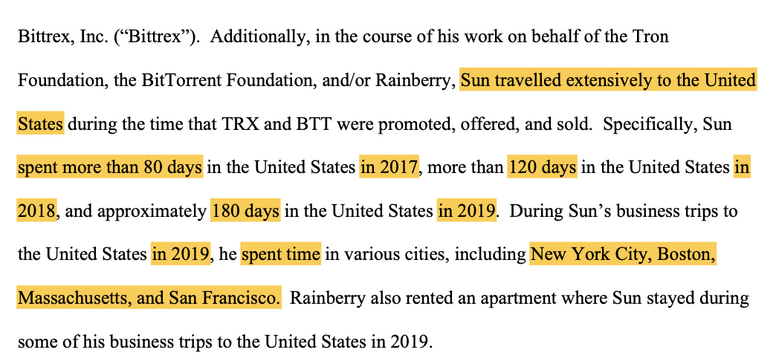Last month, Tron‘s founder Justin Sun had requested the dismissal of the case on the grounds that regulators had no jurisdiction. Following this move, the US Securities and Exchange Commission (SEC) made a new move against Sun. The SEC claimed that Sun traveled extensively to the US and influenced the case. Let’s look at the SEC’s allegations.
SEC Files Amended Complaint Against Justin Sun
The regulatory body, in its amended complaint filed in a federal court in Manhattan, argues that Sun and other businesses he controls are subject to personal jurisdiction because they intentionally acted in and towards the US.

The SEC claimed that between 2017 and 2019, Sun spent over 380 days in the US during business trips to New York City, Boston, Massachusetts, and San Francisco. These trips were allegedly on behalf of what were called Sun’s “alter ego” companies, including the Tron Foundation, BitTorrent Foundation, and Rainberry.
SEC’s Allegations
In the initial lawsuit filed last month, the SEC reiterated its allegations that Sun and his companies sold unregistered securities through the Tron Foundation. It accused Sun of engaging in “manipulative wash trading” with TRX and BitTorrent (BTT) tokens.
The SEC carefully claimed that TRX and BTT were introduced, presented, and sold to consumers and investors in the United States. The SEC also added that “Sun traveled extensively to the United States during the period when TRX and BTT were being introduced, presented, and sold.”
Wash Trading at This Exchange
The SEC also claimed that the alleged TRX wash trades took place at the Seattle-based cryptocurrency exchange Bittrex. At the end of March, China-born Sun argued that the SEC was applying US securities laws “predominantly to foreign conduct” and that it had no jurisdiction over him or the Singapore-based Tron Foundation, requesting the dismissal of the case.
Sun also stated that the cryptocurrencies TRX and BTT tokens were “entirely sold abroad” and that the sales did not take place in the US market. Sun also noted that there was no statement in the SEC’s allegations that the tokens were “initially offered to or sold to any US resident.”










